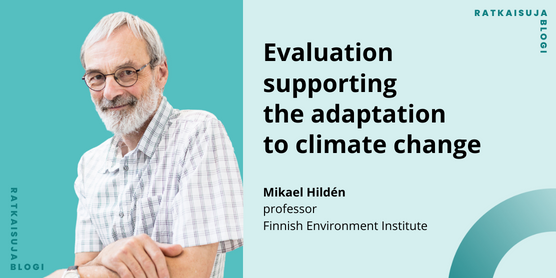
The recent IPCC assessment reports (2021 , 2022a , 2022b) provide global and regional analyses of climate change. There are no doubts that adaptation is needed but needs and capacities vary across the globe. It is therefore relevant to examine actions at the national and even subnational level.
We conducted a study to take stock of the situation in Finland and to provide recommendations for adaptation policies meeting the challenges ahead. The study was a joint effort by the Finnish Environment Institute, the Natural Resources Institute Finland, the Finnish Meteorological Institute, University of Helsinki, Tyrsky Consulting and the Finnish Institute for Health and Welfare.
With a National Adaptation Strategy agreed upon in 2005, Finland prides itself by being one of the forerunners in planning adaptation. In 2015 a National Adaption Plan was prepared, and by the end of 2022 a new plan is due. Our evaluation supports the preparation by focusing on what especially the public sector has done to improve the adaptive capacity.
In the study we checked recent strategic and legal documents from administrative branches for evidence that climate change has been recognised. We explored regional and local level adaptation activities through workshops and a survey targeted at municipalities, and we collected information on resources devoted to adaptation. To identify challenges and provide suggestions for actions we combined our analysis with available projections for climate change impacts in Finland.
The good news is that all branches and levels of administration recognise climate change as a relevant topic – explicit references to climate change are made in numerous documents. The recognition varies, in some it is a mere statement whereas in others concrete action is foreseen.
Many of the challenges that were noted have been observed in all countries working to strengthen adaptation: a lack of resources hinders progress and there is a need for knowledge on how to address climate change in specific local contexts and sectors. Some authorities, especially at the regional and local level, are also uncertain about which organisation should take the lead in adaptation activities that cross administrative borders.
Russia’s attack on Ukraine has furthermore shown that non-climatic events interact with climatic events
Our evaluation concluded that the goal stated in the National Adaptation Plan of 2015 to increase adaptive capacity is, no doubt, still valid. But the premises for strengthening adaptive capacity have changed. First, cross-border impacts, i.e., impacts that arise elsewhere, but which reach Finland through various transmission mechanisms are of increasing concern.
Russia’s attack on Ukraine has furthermore shown that non-climatic events interact with climatic events, resulting in, for example, serious consequences for global food security. Second, questions about fairness regarding the impacts of climate change and the societal actions needed to adapt to them get increasing attention. Third, the overall sustainability of adaptation activities and climate action generally is considered more than ever before.
There is no universal solution that would deal with all the challenges. Our suggestions for action build on four areas that should interact to achieve greater adaptive capacity. Education and training are continuously needed on all levels, from practitioners to strategic planners.
Coordination is a must to ensure coherence in action and to foster learning across branches and sectors, including the private sector. Research, development, and innovation can address new arising themes, but to do so, new, and bold combinations of skills and topics should be encouraged.
Finally, none of the preceding three areas can progress without resources. There is a justified demand for additional resources, but we also conclude that a successful combination of all four areas in a positive ‘nexus’-thinking can keep the need for additional resources moderate and even generate new resources through marketable innovations for resilient production in, for example, food production or the energy system.
Mikael Hildén is professor and Director of the Climate Change Program in SYKE. In his spare time he adapt to climate change in small scale gardening